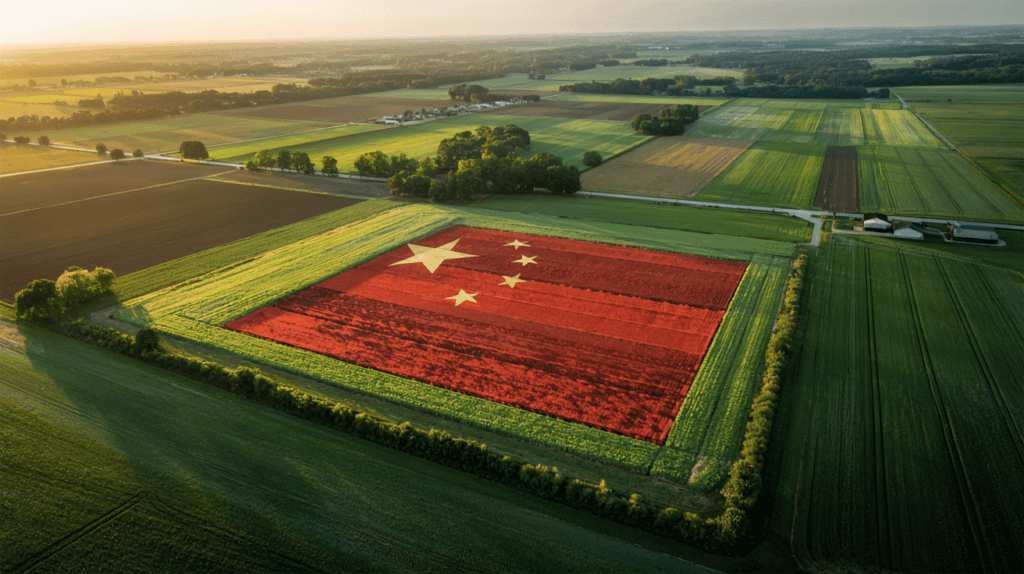In a world of global commerce, there’s a rising concern about who owns the land Americans call home…and it’s not just one country snapping up U.S. farmland and other vital assets. Many people are now wondering how foreign ownership could affect national security and the livelihoods of real Americans.
Countries like China have been increasingly eyeing American soil, and this has stirred debates and concerns across the country.
Imagine waking up one day to find out the farm down your street or the port in your city has been bought by a foreign entity. It’s not just an economic transaction; it’s a piece of America slipping away. Foreign ownership of farmland, ports, and other strategic locations could mean bigger implications for the country’s safety and economy. Lawmakers are taking a hard look at how these national security concerns translate into political action, leading to proposed legislation aiming to restrict such purchases.
So how can citizens make a difference? There are ways real Americans can voice their concerns and potentially influence change. Engaging in local politics, spreading awareness, and understanding the legal processes involved are a few paths to explore.
It’s a complex issue, but one thing is clear: the stakes are high, and the conversation is far from over.
Who’s Buying the Farm? The Reality of Foreign-Owned American Land
Foreign ownership of American land is a hot topic, capturing the minds of people worried about economic and national interests. Several countries are buying up farmland across the U.S., and it’s got folks talking. Who exactly is buying this land, and what does it mean for America?
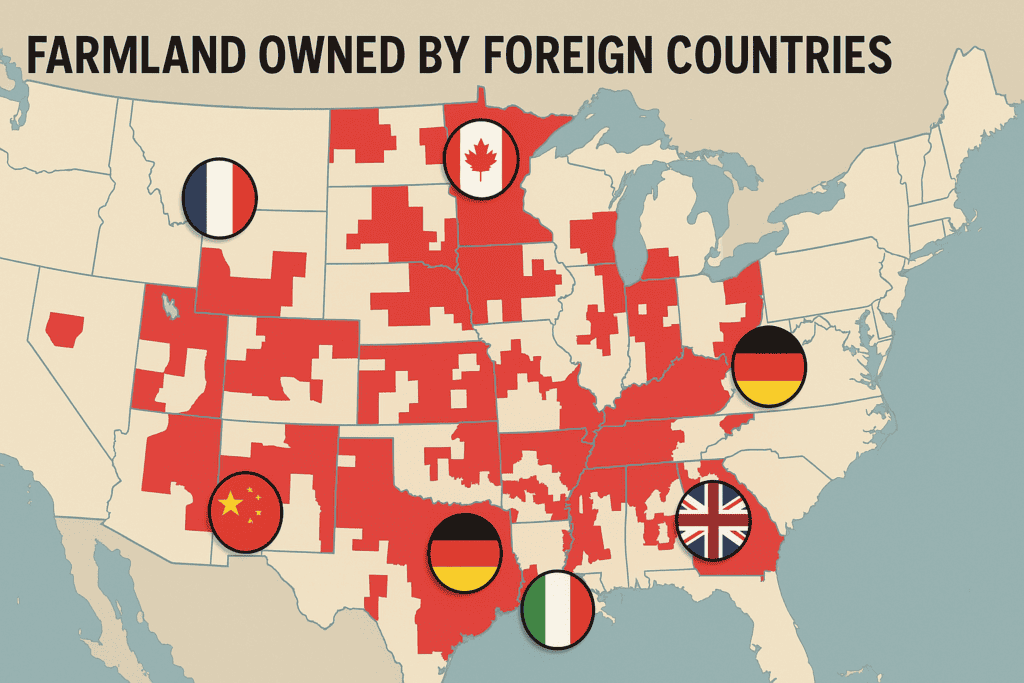
Identifying Major Foreign Players
Think a moment about the top buyers of U.S. land. Canada, for instance, holds a significant portion, owning more land than the entire state of Vermont. It’s not just our northern neighbors either. Investors from Australia and European countries have made their mark, too. Watching these big players sweep up land like it’s a Monopoly game can make you wonder: Is this new wave of foreign ownership good or bad?
Foreign investments bring in cash, sometimes revitalizing rural economies. On the flip side, it often raises unease over how much control non-U.S. entities hold. And while it’s true that foreign ownership isn’t new, the scale and speed are what grab attention.
The Scope of Foreign Land Ownership
Foreign companies and individuals hold a surprising amount of U.S. land, accounting for about 3.1% of privately held agricultural property. That may not sound like much until you consider the creeping rise over the past few decades. This isn’t just farmland, either. Ports, forests, and even essential infrastructure are under foreign hands.
In 2021, it was noted that China owned less than 1% of foreign-held land in the U.S., but numbers fluctuate. Countries from around the world find their own slices of America. Could this foreign hold tighten Americans’ own grip on their homeland’s resources?
Scrutinizing Chinese Involvement
China often becomes the focus of public debate on this issue. With the country’s strategic purchases, some worry about its intentions. Chinese companies have been investing in farmland and major food companies, which stirs fears of economic influence. For some lawmakers, it’s a call to action. They’ve started pushing for limits on how much land foreign entities can buy, especially near sensitive sites.
Why all this fuss? Owning land means power—economic influence, food control, and a stake in the American future. While Chinese ownership remains tiny compared to the whole, its impact looms large in public conversations. So, when folks talk about what foreigners own, they’re often eyeing the Dragon’s slice of the pie.
Digging Into Policy Soil: Agriculture and National Security
The relationship between foreign investments in U.S. farmland and national security is like a chess game where each move matters. Who sets the rules? How do these policies impact security?
The Workings of CFIUS
The Committee on Foreign Investment in the United States, or CFIUS, is like the referee in this game. This interagency group evaluates foreign investments to ensure they don’t harm U.S. interests. With foreign buyers eyeing American agricultural properties, CFIUS has its hands full.
They review and can potentially block transactions if they see a national security risk. Imagine a piece of farmland close to a military base sold to a foreign entity; CFIUS would step in to scrutinize such deals. They ensure enemies don’t use such purchases for intelligence gathering.

Agricultural Land and National Security Risks
Buying American farmland isn’t just about crops and pastures. It’s about who controls valuable land resources near key facilities. Such land purchases can pose national security risks.
Foreign ownership of agricultural land has increased in recent years. National security concerns arise when buyers come from countries considered adversaries, like China or Iran. These lands can also be near sensitive installations, making them strategic points. Knowing what’s at stake helps in understanding why certain sale proposals raise eyebrows.
The AFIDA Framework
The Agricultural Foreign Investment Disclosure Act (AFIDA) lays down the rules of the land. All foreign entities owning U.S. agricultural land must report their holdings. This data helps government agencies like the USDA keep an eye on foreign land ownership patterns.
Through AFIDA, policymakers can track who owns what and where. This insight is key, helping protect U.S. interests and ensuring foreign purchases don’t slip under the radar. That’s why AFIDA is such a critical part of protecting American soil.
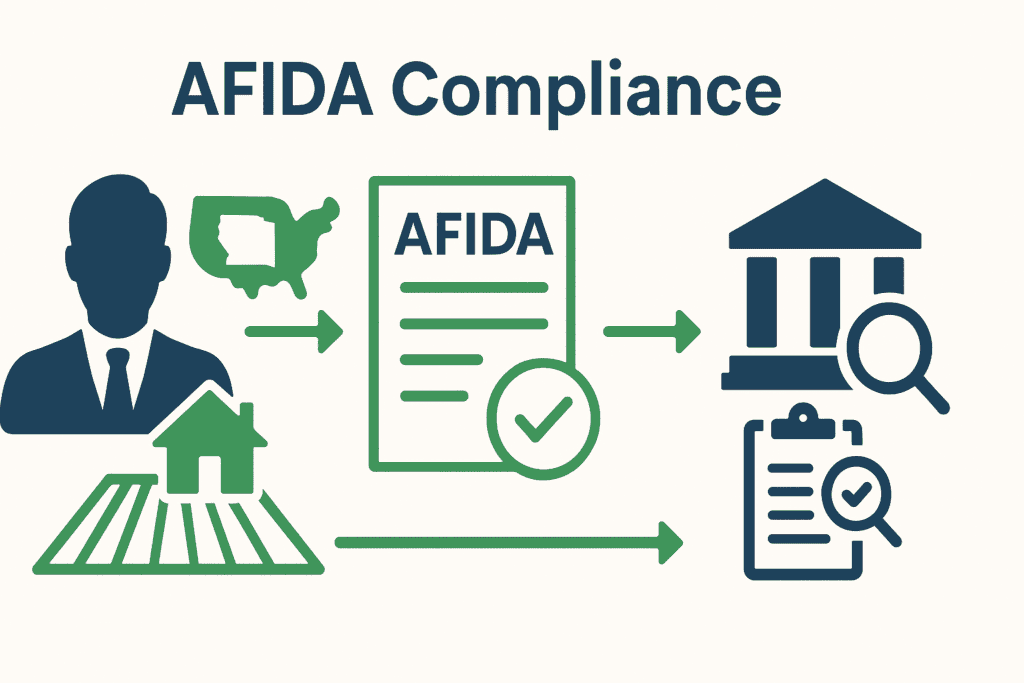
Tackling Transparency and Regulation
In a world where land sees more action than some action heroes, understanding who owns what is vital. When it comes to farmlands, ports, and other American assets, it’s important to know who’s buying and how things are tracked. Let’s dig into how transparency and regulation play roles in this game.
Understanding Disclosure Requirements
Having the dirt on land ownership means understanding disclosure rules. These rules are crucial for knowing who owns U.S. assets. The Agricultural Foreign Investment Disclosure Act requires foreign entities to report land purchases to the USDA. This helps track foreign ownership in big ways.
Regulations demand that buyers disclose their intentions and identities. When parties comply, it allows the public and oversight bodies to keep tabs, making sure there aren’t shady dealings. This transparency prevents scenarios where foreign buyers hold significant sway over crucial resources.
Discussing Database Relevance and Reporting Systems
When it comes to tracking land ownership, the effectiveness of databases and reporting systems can’t be overstated. The USDA data is one such tool, maintaining records of foreign land ownership.
Databases like these give officials a bird’s eye view, and they’re crucial for informed policy decisions. But are they always up to date? That’s the million-dollar question.
One can think of this database like a roadmap. It points out who owns what and how much, affecting how policies are shaped. For these systems to be truly effective, they need constant updates and consistent oversight to stay in touch with the ever-changing landscape. It’s not just about gathering data; it’s about ensuring the data is accurate and relevant.
Penalties for Noncompliance
Regulations aren’t suggestions; they’re the law. And when it comes to compliance, penalties for violations can be steep. If foreign entities fail to report land purchases, they could face fines and even lose their right to own land.
Penalties are like the watchdog keeping everything orderly. They ensure foreign parties know the stakes of concealing information. So the message is clear: obey the law, or face consequences. Without these penalties, the incentive to follow rules might wane, shaking the foundation of trust that these regulations aim to build.
Guarding the Gate: Protecting American Interests
Ensuring that American land and key interests remain under US control requires strategic actions from lawmakers, regulatory adjustments, and empowering local communities. These efforts are crucial as foreign investments in farmland and ports grow, posing potential risks to national security and food supplies.

The Role of Lawmakers and State Regulations
Lawmakers have a big role here. Several states have turned the spotlight on foreign ownership of agricultural land. State laws differ, but many aim to prevent foreign adversaries from grabbing too much control.
Some states have put limits on how much farmland someone not from the US can own. For instance, in Iowa, there’s a clear message: farmland should belong to folks who are part of the community and not just here for profit. As laws develop, the emphasis is often on local impacts. Can these rules ensure America’s safety while keeping markets open? That’s the puzzle lawmakers are trying to solve.
Proposals for Restricting Foreign Investments
Recent proposals in Congress suggest more restrictions on foreign powers. They’re targeting specific countries due to national security worries.
These plans argue that additional scrutiny and limits could stop espionage activities around sensitive locations, like military sites. These measures could be serious game-changers. Imagine a future where foreign investment isn’t an open door for adversaries. Instead, strategic thinking would mean balancing economic interests with security.
Could tighter restrictions hinder economic growth? Yes, but the scales need to balance safety over unchecked foreign influence to protect national interests.
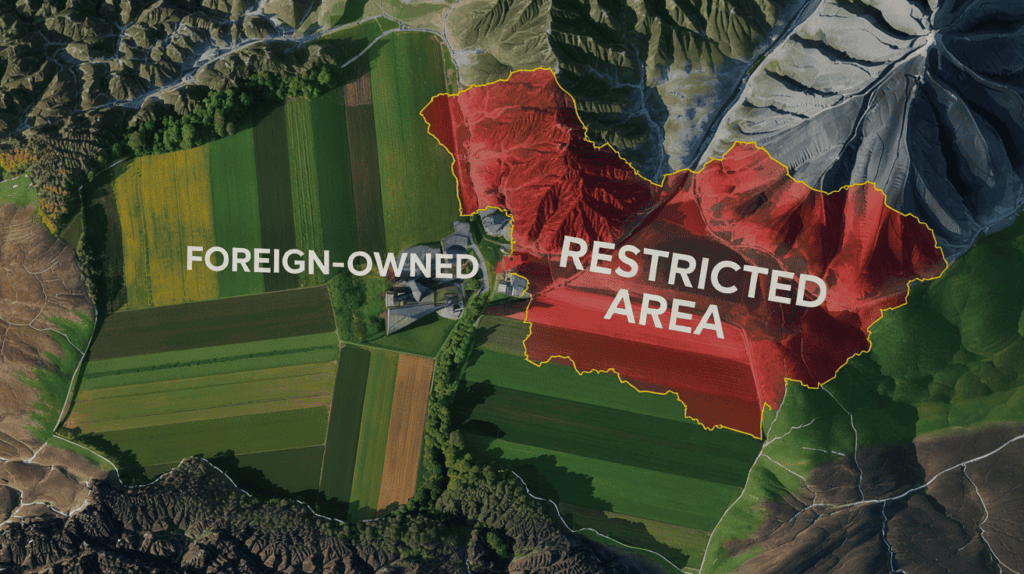
Empowering American Farmers and Rural Development
Farmers, the backbone of America, deserve more resources. They’re facing challenges like land prices soaring due to foreign buyers.
Support could include financial help to purchase and keep their farms. Community support programs could also strengthen rural development, making these areas prosperous and resilient.
Efforts to boost family farms could involve tax incentives or grants, ensuring the land stays in American hands. By investing in rural infrastructure, communities can thrive. This approach doesn’t just protect farmland—it protects a way of life. Supporting local farmers isn’t just about land; it’s about maintaining food security and the heart of communities across America.
Ripe for Reform? Looking Towards a Sustainable Future
Is the future of American farmland as bright as we hope? With more foreign investments in agriculture, the landscape is shifting.
Agricultural policy needs to reflect this change. Many folks believe reform is necessary to balance foreign investments and local needs. It’s a tightrope walk between global economics and national interests.
Corporate farming plays a huge role here. Large agricultural corporations use advanced biotechnology to increase yields and efficiency. While impressive, it raises questions about sustainability and control. Are these advances benefiting everyone or just a few big players?
When thinking about reforms, focusing on small, local farmers could help create a sustainable future. Supporting these farmers might mean more local produce, fewer transportation emissions, and better land use. Plus, it keeps the community spirit alive.
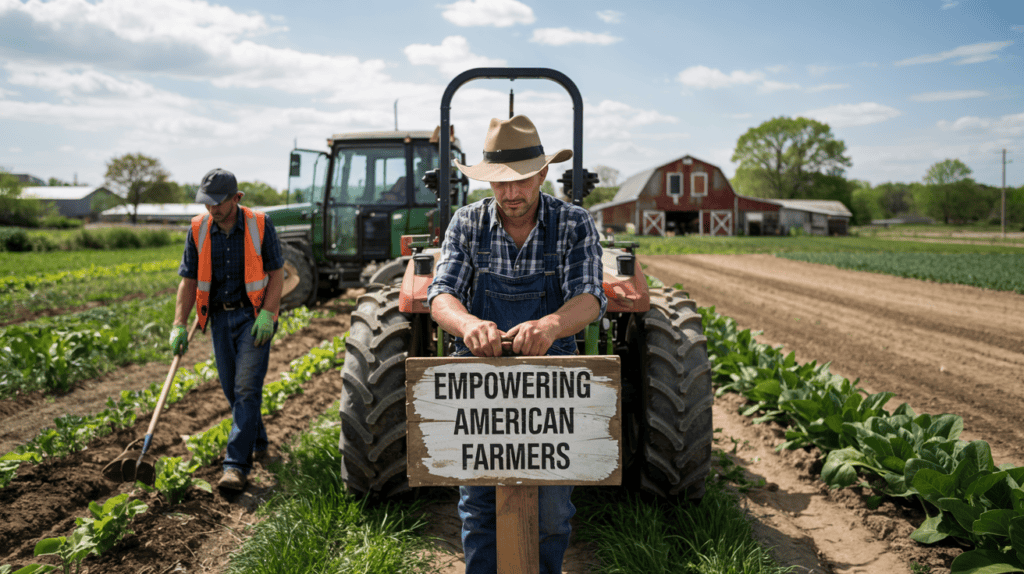
How can the community contribute? Public awareness and community involvement might be key.
Encouraging discussions and actions at the local level can drive policy changes. It’s like a ripple effect—change starts small and builds momentum.
Maybe the next step is a stronger regulatory framework. Could tighter regulations around foreign ownership be the answer?
Opinions differ, but many agree that revisiting existing policies is a step in the right direction. After all, who really wants important pieces of American heritage in foreign hands?

